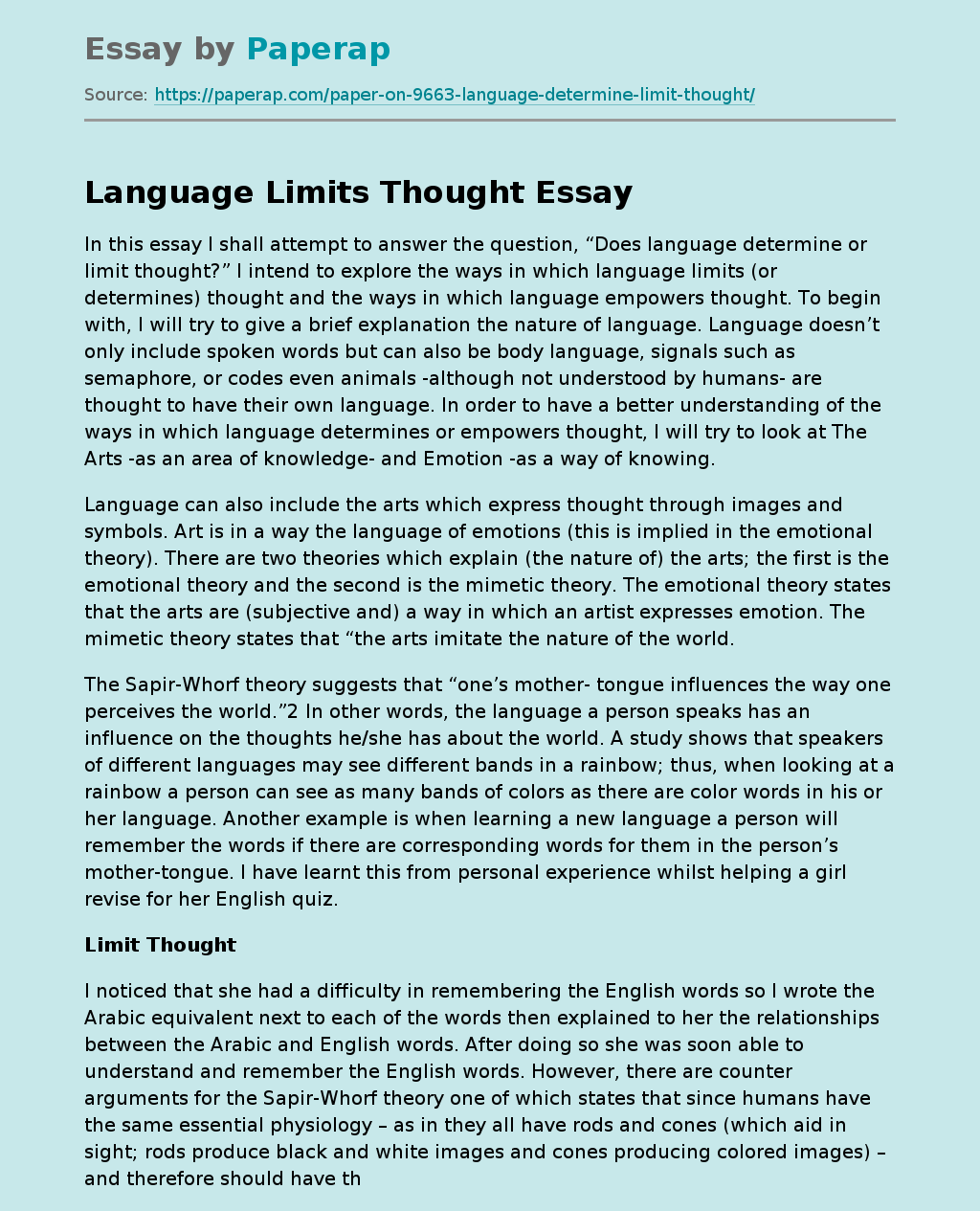Language Limits Thought
The following sample essay on “Language Limits Thought”: in this essay author attempts to answer the question, “Does language determine or limit thought?” I intend to explore the ways in which language limits (or determines) thought and the ways in which language empowers thought.
To begin with, I will try to give a brief explanation the nature of language. Language doesn’t only include spoken words but can also be body language, signals such as semaphore, or codes even animals -although not understood by humans- are thought to have their own language.
In order to have a better understanding of the ways in which language determines or empowers thought, I will try to look at The Arts -as an area of knowledge- and Emotion -as a way of knowing.
Language can also include the arts which express thought through images and symbols. Art is in a way the language of emotions (this is implied in the emotional theory). There are two theories which explain (the nature of) the arts; the first is the emotional theory and the second is the mimetic theory.
The emotional theory states that the arts are (subjective and) a way in which an artist expresses emotion. The mimetic theory states that “the arts imitate the nature of the world.
The Sapir-Whorf theory suggests that “one’s mother- tongue influences the way one perceives the world.” In other words, the language a person speaks has an influence on the thoughts he/she has about the world. A study shows that speakers of different languages may see different bands in a rainbow; thus, when looking at a rainbow a person can see as many bands of colors as there are color words in his or her language.
Another example is when learning a new language a person will remember the words if there are corresponding words for them in the person’s mother-tongue. I have learnt this from personal experience whilst helping a girl revise for her English quiz.
Limit Thought
I noticed that she had a difficulty in remembering the English words so I wrote the Arabic equivalent next to each of the words then explained to her the relationships between the Arabic and English words. After doing so she was soon able to understand and remember the English words. However, there are counter arguments for the Sapir-Whorf theory one of which states that since humans have the same essential physiology – as in they all have rods and cones (which aid in sight; rods produce black and white images and cones producing colored images) – and therefore should have the ability to distinguish colors even with the unavailability of words for those colors. “How would babies learn to perceive color if they needed language to do so?”
Language limits/determines thoughts by adding/using/attaching distinguishing features. For example when a person reads the word “boat”, the word causes the person to visualize it in his/her mind. One person’s image of the word “boat” might be different than the image that another person has in his or her mind this is due to the fact that there are many types of boats. However, when the word “rowing” is added before the word “boat”; the two people are likely to visualize the same image.
Language gives life to thoughts and ideas. Hans Reichenbach once said, “If you can’t say it, you don’t know it.” This gives the idea that if a thought cannot be expressed with the use of language then it does not exist to others (or it is not known). For instance, “if someone doesn’t believe in fairies, he doesn’t need to teach his children ‘there are no fairies’; he can omit to teach them the word ‘fairy’.” (zettel 413).
Language can limit thought in the way that it can be used to abolish thoughts and ideas. An example of this is Orwell’s book “Nineteen Eighty-Four”. In the book, the official language spoken in Oceania is “Newspeak” which is a version of the English language. “The purpose of Oceania’s official language, Newspeak is to reshape the English language to prevent thoughtcrime.” The idea behind this is if a word is eliminated then the thought behind it is non-existent.
Language is significant; it gives expression to life itself. Without language, one way of knowing is lost. Language allows thoughts and ideas to be conveyed simply and clearly. However, we cannot express through language what we do not have words for, “about what one cannot speak, one must remain silent”. “I know more than I can say,” said Michael Polanyi. The ability to express a thought is dependent on our skill in the use of language; mainly our vocabulary but not all ideas and thoughts can be expressed easily; such as when describing emotions.
Language Limits Thought. (2019, Dec 05). Retrieved from https://paperap.com/paper-on-9663-language-determine-limit-thought/

